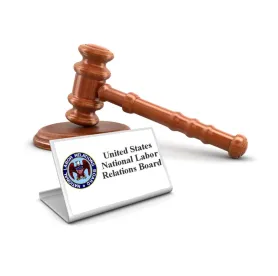The National Labor Relations Board (NLRB) General Counsel (GC) has weighed in on several COVID-19-related issues under the National Labor Relations Act (NLRA).
The GC’s opinions are contained in Advice Memoranda that reflect an understanding that unionized employers must have flexibility to deal with pandemic-related issues quickly.
Advice Memoranda
Advice Memoranda are issued by the GC when NLRB regional offices, where unfair labor practice charges are filed and investigated, request advice about whether a particular charge has merit and should be pursued.
The Advice Memoranda do not have the force of law — only NLRB decisions and rules do. However, an Advice Memorandum instructing an NLRB Regional Office to dismiss an unfair labor practice charge effectively constitutes a victory for the charged party because it generally spells the end of the charge.
Most Advice Memoranda are multi-page documents that detail the facts relevant to the issue, followed by a detailed discussion of applicable NLRB decisions and how those decisions apply to the facts. However, perhaps because they had to be issued quickly, for the most part, these Advice Memoranda are one-page emails containing very little factual or case law discussion or analysis.
Mercy Health General Campus, 07-CA-258425 (decided June 10, 2020, issued July 15, 2020)
The employer unilaterally changed its work-from-home and attendance policies. The union alleged the employer violated the NLRA because it had an obligation to bargain before implementing the changes.
The GC found the work-from-home policy did not apply to the employer’s unionized employees, and thus, there was no change to the unionized employees’ working conditions. Regarding the attendance policy, at the beginning of the COVID-19 pandemic, the employer issued a modified attendance policy consistent with a proposal that had been made by the union. (The union proposed to “pause all attendance and tardy-related penalties….”) The employer did so without telling the union it agreed to the proposal. The GC said, “[T]he Employer’s actions are understandable in the circumstances where, as an acute-care hospital, time was of the essence in dealing with the emergency pandemic situation.”
Most important, the GC stated that even if the unilateral implementation of the two policies had violated the NLRA, “an employer should be permitted to, at least initially, act unilaterally during emergencies such as COVID-19 so long as its actions are reasonably related to the emergency situation.” The GC added that, to the extent the employer has an obligation to bargain over the decision — for example, the parties’ collective-bargaining agreement (CBA) may give the employer the unilateral right to implement or change policies — the employer must negotiate over the decision and its effects within a reasonable time after implementation
Larry Peel Co., 16-CA-259403 (decided June 15, 2020, issued July 15, 2020)
The employer discharged an employee after the employee requested to work at home due to COVID-19. In connection with the request, the employee and the employer’s controller texted on their personal cellphones about the employee’s COVID-related health and safety concerns.
The GC decided the employee was not engaged in protected concerted activity in that regard because the controller was not considered an employee under the NLRA. The GC also held that, in any event, the employer was unaware of the texts, and the employee’s request was individual in nature.
RS Electric Corp., 14-CA-260142 (decided June 19, 2020, issued July 15, 2020)
The CBA between the union and the employer gave the union the right to access jobsites at any reasonable time. During the COVID-19 pandemic, the union demanded immediate unrestricted access. The employer asserted that it needed one hour’s advance notice to prepare for safe access. The GC decided that was “not at all clear that the Union’s demand for the unrestricted access was reasonable in light of the COVID-19 pandemic, and the Union did not seek to bargain about the Employer’s view of reasonableness….”
In a non-COVID-19-related holding, the GC also invoked the NLRB’s decision about the “contract coverage defense” to a unilateral change. MV Transportation, Inc., 368 NLRB No. 66 (2019). (For more on MV Transportation, see our article, Labor Board Adopts ‘Contract Coverage’ Standard in Unilateral Change Cases, Overturns Precedent.) The GC held, “[T]he contractual limit on access to ‘any reasonable time’ gave the employer the right, … to require one hour advance notice.”
Children School Services, 05-CA-258669 (decided June 30, 2020, issued July 15, 2020)
The District of Columbia closed its public schools as a response to the COVID-19 pandemic. The employer laid off employees and offered them temporary work assignments to perform COVID-19 testing or contact tracing in partnership with the District of Columbia government in lieu of layoff. The union filed an unfair labor practice charge alleging the layoffs and the offer of temporary work assignments without bargaining violated the NLRA.
Regarding the layoffs, the GC determined that because the CBA contains an entire article devoted to layoffs and the management rights clause contained a “general right to layoff,” the decision to lay off employees “was within the compass or scope of contract provisions granting the employer the right to act unilaterally” under MV Transportation, Inc.
Regarding the temporary assignments, among other reasons, the GC held that exigent circumstances existed and enough pre-implementation bargaining had taken place.
***
Employers are being given leeway by the GC to operate their businesses during the COVID-19 pandemic. However, employers should narrowly tailor their actions to the particular situation and, where feasible, attempt to discuss that action with the union prior to implementation.





 />i
/>i

